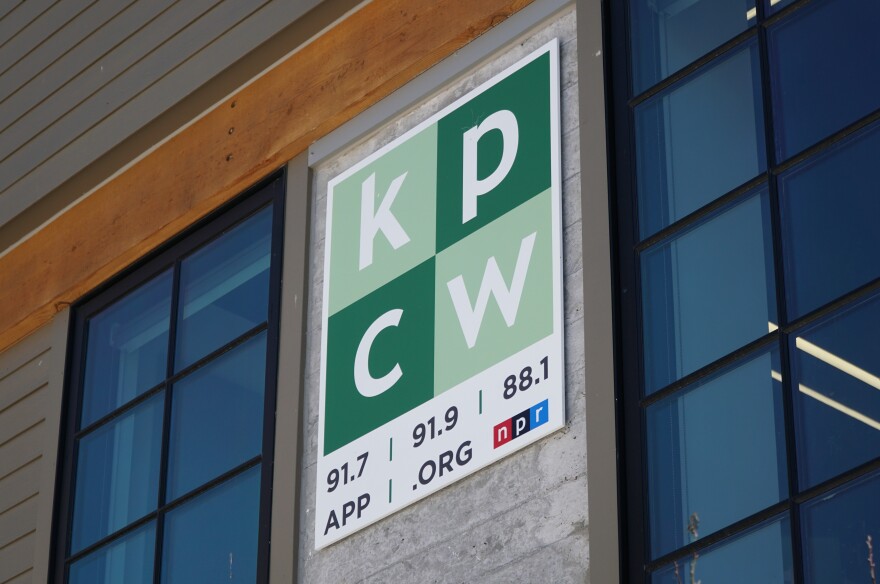Brendan Carr, the newly-appointed head of the Federal Communications Commission, wants to investigate public media.
In January he announced inquiries into National Public Radio, of which KPCW is a member, and the Public Broadcasting Service.
But the FCC doesn’t directly regulate those services. Instead, it regulates content on the United States’ roughly 1,500 public broadcasters that run NPR and PBS programming.
Bloomberg News reported earlier in March that Carr sent letters to 13 public radio stations, including WBUR, WBEZ and KPCC, asking them to compile materials detailing past sponsorships by the end of the month.
KPCW was not one of the NPR member stations to receive a letter, but did proactively seek legal counsel.
KPCW's attorney Brad Deutsch, from Foster Garvey, said the station has been following the legal requirements.
As a 501(c)(3) nonprofit, KPCW has always disclosed significant financial contributions through the Internal Revenue Services’ Form 990. That form and all the station’s public reports are posted at KPCW.org and have always been publicly available.
KPCW will continue to disclose all underwriters as well as individual donors who give more than $5,000 annually, publishing more than what’s asked in Form 990.
And now, KPCW’s audience will hear an increase of financial supporters noted in news broadcasts. Readers will find the same disclosures online in reports covering organizations that have donated to KPCW. This practice goes beyond what is required.
KPCW General Manager Juliana Allely said it’s an effort to be as transparent as possible in an era when public media is increasingly under the microscope.
“We're doing that really from a best practice perspective,” she said. “So many people in our community are on our airwaves because they're part of a news story or they're part of an interview or they're an expert on one of our public affairs programs, and we want to be clear for listeners and readers that those people may work for a financial supporter of the station.”
Deutsch said giving listeners and readers more information helps them make up their own minds.
“As a trusted news source, public broadcasters want to make sure that listeners have the information that they need in order to properly assess the information that they're being provided,” he said.
The FCC chairman has accused NPR and PBS of violating policy by airing commercials. In public media, on-air sponsored spots are called “underwriting.”
The FCC defines what underwriters can say on air. Generally speaking, underwriters cannot solicit “calls to action” or use comparative or qualitative language.
“Sponsor messages can't cross into advertising, which is meant to entice the audience to purchase something, sway opinions on public issues or support a political candidate,” writes NPR Public Editor Kelly McBride. “Sponsor messages can convey information, but they cannot shout out a price or compare one product or service to another.”
Those are the rules Carr said NPR and PBS could be violating in his Jan. 29 letter.
NPR CEO Katherine Maher has said the network’s underwriting complies with federal regulations.
Carr didn’t raise allegations of news bias, but critics claim he’s weaponizing the FCC against outlets deemed liberal media and giving conservative media a break. He reopened the investigations into ABC, NBC and CBS that the outgoing Democratic FCC chair dismissed — but not the one against Fox.
Semafor’s Ben Smith asked him about it last month, and Carr responded that the FCC “operates by case law and precedent.” He said there was “a lot of weaponization at the FCC” under the Biden administration.
NPR and PBS have always asserted impartiality but developed reputations as center-left-leaning news organizations.
NPR senior business editor Uri Berliner quit last April, after he published a column about biases he thought crept into national coverage and received a five-day suspension for submitting work to another outlet without permission.
Paul Haaga, former NPR chairman, interim CEO and self-described lifelong Republican, addressed allegations of bias in The Washington Post opinion pages a month later. Both men oppose defunding NPR.
But Carr says that if NPR and PBS are airing underwriting that crosses the line into prohibited commercial content, they shouldn’t receive taxpayer funding.
NPR gets about 1% of its budget directly from the federal government. The rest of the taxpayer money comes by way of the nonprofit Corporation for Public Broadcasting, which gets its money from Congress.
Congress began financing public broadcasting, especially radio, in 1967 partly to ensure citizens have access to emergency information at critical times. Rural public radio stations like KPCW tend to rely more heavily on CPB funding than urban stations.
And similar to how the FCC doesn’t directly regulate NPR, the CPB doesn’t directly fund NPR.
Instead, it grants funds to the hundreds of public radio stations around the country, including KPCW, where it accounts for about 12% of the annual budget.
Member stations then pay NPR for the rights to air shows like Morning Edition, Fresh Air, Planet Money, All Songs Considered, Alt Latino and Wait Wait…Don’t Tell Me! to name a few.
NPR says its member stations, in aggregate, receive 8% of their funding from the CPB, another 6% from government grants and half from individual donors.
The CPB requires stations to use about a quarter of the money it provides to pay for nationally-distributed content.
There are more national distributors than just NPR. CPB’s money can go to American Public Media, for example, which licenses the show Marketplace.
Click here to see NPR's breakdown of its own finances.
The Corporation for Public Broadcasting is a financial supporter of KPCW. For a full list, click here.




